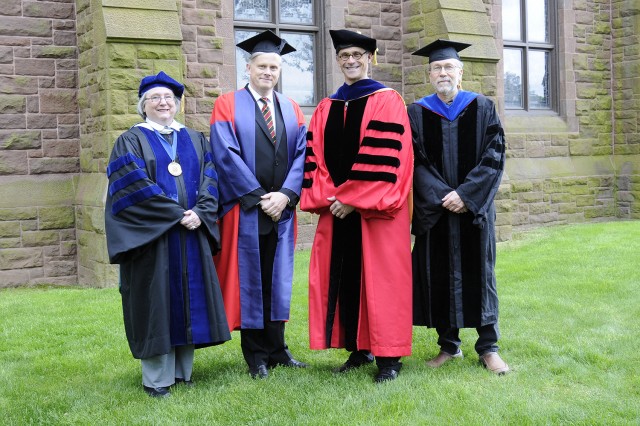Basinger, Grimmer-Solem, Wagoner Honored with Binswanger Teaching Prizes

Every year Wesleyan recognizes outstanding teaching with three Binswanger Prizes for Excellence in Teaching awarded at commencement. These prizes, made possible by gifts from the family of the late Frank G. Binswanger Sr., Hon. ’85, underscore Wesleyan’s commitment to its scholar-teachers, who are responsible for the university’s distinctive approach to liberal arts education.
Recommendations are solicited from alumni of the last 10 graduating classes, and current juniors, seniors, and graduate students. Recipients are chosen by a selection committee of faculty, emeriti, and members of the Alumni Association Executive Committee.
This year, Wesleyan honored the following faculty members for their excellence in teaching:
Jeanine Basinger, the Corwin-Fuller Professor of Film Studies, is the founder of the Wesleyan Cinema Archives and the originator of Wesleyan’s distinguished Film Studies Department, for which she defined a liberal arts approach that combines history/theory and production as a unified subject of study. She was a previous recipient of the Binswanger Prize in 1996, the winner of the Connecticut Governor’s Award for her contribution to film and the arts, and the awardee of the first and only honorary degree given to an academic by the American Film Institute in recognition of her pioneering contribution to film studies and for the influence of her former students in film and television. Two of her prominent students, Majora Carter ’88 and Joss Whedon ’87, were recipients of honorary degrees at commencement.
A proud native of South Dakota, Basinger received her entire formal education there, from first grade through master’s degree. As a nationally recognized expert on film, she has written copious articles for publications ranging from The New York Times to Opera News, and 11 books on film, including Silent Stars, The Star Machine, and her latest, I Do and I Don’t: A History of Marriage in the Movies. She serves as trustee for the American Film Institute and the National Board of Review. She also was primary advisor on Martin Scorsese’s education project, The Story of Movies; head consultant for the PBS series American Cinema: 100 Years of Filmmaking; and co-producer for the American Masters special on Clint Eastwood.
Erik Grimmer-Solem, associate professor of history, joined the Wesleyan faculty in 2002. He has a D.Phil from Oxford University, an M.Phil from Cambridge University, an M.Sc from the London School of Economics, and a BA from Brigham Young University. He has received awards and fellowships from the Fritz Thyssen Foundation, the Leverhulme Trust and the University of Chicago.
His teaching and scholarly interests are in German history, economic and social history, and the history of economic thought. He is particularly interested in the relationship between social science and policy. His courses include surveys of economic history, modern German history, and College of Social Studies history tutorials, as well as seminars on the welfare state, the Weimar Republic, and the Holocaust. In 2005 he received Wesleyan’s Carol A. Baker Memorial Prize for excellence in teaching and research.
He is the author of The Rise of Historical Economics and Social Reform in Germany, 1864–1894, published by Oxford University Press. His scholarly articles have appeared in such journals as the Leo Baeck Institute Year Book, German History, and the Journal of World History. A second book, Empire of the Mind: German Political Economy and the World, 1880–1918, will appear in 2014.
Phillip Wagoner, professor of art history, professor of archaeology, holds a BA from Kenyon College and a Ph.D from the University of Wisconsin. He has taught at Wesleyan since 1988, offering courses in the art history department and the archaeology program, as well as in the Freeman Center for East Asian Studies, where he has also served as curator. He has spent sabbatical years in the Deccan region of South India, associated with the Vijayanagara Research Project, an international team of scholars in different disciplines dedicated to documentation and interpretation of the site of Vijayanagara, capital of the state that dominated the southern part of the Indian peninsula between the 1340s and 1565.
Professor Wagoner’s primary interest is in the historical interactions between the established Indic culture of the Deccan region and the Persianate culture that arrived in the early 14th century. Since 2000, his work has increasingly focused on Persianate Islamic architecture in this region. The author of two books and many journal articles, he has recently completed a third book, Power, Memory, Architecture: Contested Sites on India’s Deccan Plateau, 1300–1600, co-authored with historian Richard M. Eaton.

